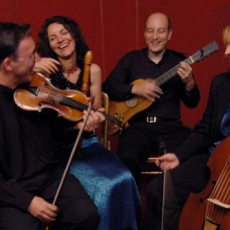
Venice, Leipzig, Versailles and London Collections - Palladian Ensemble - Music OMH
Since launching onto the international music scene in 1991, the Palladian Ensemble has established itself as one of the foremost interpreters of Baroque chamber music. Only William Carter remains from the original quartet, which included Rachel Podger, Pamela Thorby and Joanna Levine, but violinist Rodolfo Richter, viol player Susanne Heinrich and harpsichordist Silas Standage have since joined him, and the group is now known simply as the Palladians to allow for collaborative flexibility.
In a timely celebration of their diverse range of artists and material the group have reissued eight highly acclaimed albums, smartly packaged in glossy cardboard boxes and grouped as four capitals of Baroque music: Venice, Leipzig, Versailles and London. Despite the titles there is a certain amount of overlap, though no direct duplication, and the nationality of the chosen composers is not dictated; Nicola Matteis and Matthew Locke appear in both the Venice and London collections, for example.
An Excess of Pleasure and The Winged Lion are the irresistible titles in the Venice collection and remain two of their best-selling albums. They are bristling with music inspired by, or written in, La Serinissima - though serene is not the word for this paeanic anthology. The former begins with Marco Uccelini's innocent, nursery-rhymish rondo Aria Soptra La Bergamasca and from there move through the more sophisticated charms of Locke and John Blow.
It is the Matteis selection that is the real highlight, however; his Ground After the Scotch Humour bubbles with exuberance and his giddy second Ayre for Violin is tantamount to aural Prozac. The second album features an even more diverse assortment, with two elegant Vivaldi concertos sitting amongst fascinating scraps by lesser known composers such as Dario Castello and Francesco Turini.
From one playground of the rich and famous to another. Louis XIV's Versailles court is brought to life with The Sun King's Paradise and Les Elemens, featuring pieces by Marin Marais, Etienne Le Moine, François Couperin and Jean-Féry Rebel. The first album includes a range of shorter courtly works, whilst the second examines the work of Rebel and Marais in greater detail.
Three of the Marais' suites are arranged over the two albums and are afforded gentle and airy performances. Likewise, the interpretation of Rebel's radical Creation piece Les Elemens lacks the thunderous force of recordings by larger ensembles, and the tempo slows at times, but in its place we can enjoy a searing, raw quality to the strings and the recorders are given space to revel in the bird-song delicacy of 'Rossignols' and the languid 'Sicillienne'.
Not surprisingly, the Leipzig compilation is devoted exclusively to its local hero with two albums entitled Bach Trio Sonatas and Bach Sonatas and Chorales. The former features six pieces that the composer originally set for organ while instructing his son Wilhelm Friedemann and concludes with a set of fourteen canons that in 1975 were discovered at the back of Bach's personal copy of the Goldberg Variations.
The second collection continues very much in the same vein with three trio sonatas and his Violin Sonata in G Major. Whilst these sonatas may sound slightly insipid for those who are used to punchier interpretations (such as Keith Jarrett and Kim Kashkashian's popular harpsichord and viola da gamba arrangement) others will revel in the sensitivity and spaciousness of the performance.
Last but not least we turn to London with A Choice Collection and Held by the Ears, two albums that explore the music of Purcell's era, but notably not that of Purcell himself. Locke's Broken Consort in D offers a rather challenging introduction to the disc, according to Carter's informative notes (there is an essay devoted to each collection) the 'Fantazie' ranges over 13 keys within 11 bars at one point, and from there they explore some interesting works by obscure or even anonymous seventeenth-century composers. The second album is predominantly devoted to works by Matteis, who made an indelible impression on English music making.
By grouping their output geographically the Palladians could have given the illusion of straitjacketing their compilations but these definitions prove far from strict or restrictive. On the contrary, they reveal the many similarities between composers of the period, and their cosmopolitan interests, alongside the various national flavours. Throughout these eight recordings this varying ensemble of musicians offer performances of a consistently high quality, at once stylish and respectful, cutting-edge and authentic. By anyone's standards, it represents an exceptional archive of recordings.